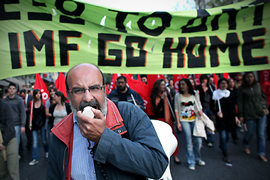G20 hails global economic recovery
Finance ministers say stimulus worked, but warn of growing debts amid Greek crisis.

Despite that upbeat assessment, Jim Flaherty, the Canadian finance minister, said the International Monetary Fund had expressed some concerns that countries were overstating their successes in tackling the crisis
|
“The world economy is recovering from the worst recession that we’ve seen since World War II” Rajiv Biswas, |
“There was some significant concern that some countries had been too optimistic in their economic projections and that cumulatively there was perhaps too much optimism,” he said.
Rajiv Biswas, the southeast Asia director of the Economist Group, told Al Jazeera he agrees with the IMF statement about the state of the global recovery.
“The world economy is recovering from the worst recession that we’ve seen since World War II. And we do expect momentum to be strong in the first half of this year,” he said.
“Overall we expect world growth of about three per cent this year, compared to two per cent last year. The momentum is very much driven out of Asia at the moment, with a strong recovery going on in east Asia and also particularly driven by China and India.
“The greater concern now is what’s happening in Europe because European growth is only expected to be one per cent this year – due to the problems in a number of countries in the EU, difficulties in the banking sector and also structural economic problems in the European economies, we don’t expect growth to improve next year.”
Greek crisis
While Greece was not formally on the agenda, it was a hot topic both among deleggates as they rallied behind an aid package of up to $60.5bn (€45bn), potentially the biggest-ever bailout of a country.
| special report | ||
|
“It is of course a source of concern to us,” Flaherty said.
“It’s essential that some steps be taken, that the Greek government work with the IMF and with the European Commission of course to identify a credible multi-year economic and fiscal programme.”
George Papaconstantinou, the Greek finance minister, is due to take part in IMF talks on Saturday after Athens asked for the European Union-IMF bailout to be activated the previous day.
Olli Rehn, the European Union economic and monetary affairs commissioner said European officials expected to complete work on a programme for Greece by May.
The Greek debt crisis has fuelled chronic instability on financial markets, undermining eurozone stability and the strength of the global economic recovery.
Bank tax
The group rich and emerging countries failed to forge consensus on how best to recover the cost of bailing out financial firms.
“There was not agreement on a global bank tax. Some countries are in favour of that, some countries quite clearly are not,” Flaherty said.
IMF experts were asked to consider “how the financial sector could make a fair and substantial contribution towards paying for any burdens associated with government interventions to repair the banking system,” the G20 statement said.
 |
| G20 officials said that the Greek deficit was ‘a source of concern’ [AFP] |
It was set to propose two taxes, one to reimburse governments for the cost of bailing out banks hit by the crisis, and another to dissuade banks from taking excessive risks in the future.
But G20 ministers face tough discussions, since opposition to the tax was expressed by countries including Brazil and Canada.
Governments worldwide spent trillions of dollars to prop up financial markets after risky bank investments tanked, driving countries like Greece deep into debt.
They also skirted over the thorny issue of whether China should allow its yuan currency to rise more rapidly to curb its export-driven growth.
G20 officials said there was no discussion of specific exchange rates.
Finally, the ministers discussed how to rebalance the global economy, a task made more complex by growing differences between the recovery in emerging and advanced economies.
Brazil, China and India have emerged from the downturn in much better shape than European, US and Japanese counterparts.
The IMF has predicted that advanced economies will grow just over three per cent this year, while emerging and developing economies should expand by more than six per cent.
